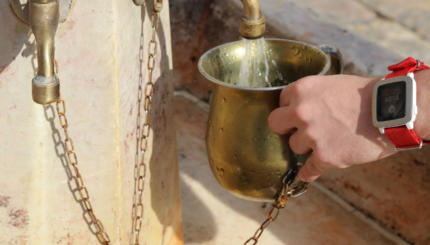The seventh blessing of the weekday Amidah begins with the Hebrew word re’eh: see. It is a prayer for personal and communal salvation that asks God to see our suffering and our pain and to redeem us from it.
The theme of God as a redeemer is prevalent throughout the Jewish prayer book, but the reference is usually formulated in the past tense — specifically to the historical memory of God saving the ancient Israelites from the clutches of Egyptian slavery. Just prior to the Amidah, we recite the prayer Emet v’Emunah, which recalls God’s redemptive powers and concludes with the following blessing: “Blessed are you, God, Who saved Israel.”
But in the Amidah itself, we shift to God’s continued and future potential to save. In the seventh blessing, we ask God to see our affliction and conclude with a present tense version of the Emet v’Emnuah blessing:
See our troubles, fight our battles, and redeem us quickly for your name’s sake because you are a strong redeemer. Blessed are You, God, Who redeems Israel.
There are myriad ways in which we find ourselves, as individuals and as a people, in need of rescue. This prayer calls upon God to see our suffering and mitigate our strife. We ask God to see us and actively intercede on our behalf, to be with us in our suffering and to fight our fights. The bullies on our proverbial playgrounds would be no match for God. We count on divine grace and strength today, as we have in the past, to deliver us from terror.

Help us keep Jewish knowledge accessible to millions of people around the world.
Your donation to My Jewish Learning fuels endless journeys of Jewish discovery. With your help, My Jewish Learning can continue to provide nonstop opportunities for learning, connection and growth.
This is why Re’eh is the place in the Amidah where we insert an additional prayer on public fast days called Aneinu, which delves even deeper into the communal experience of suffering. Re’eh, asks God to see our distress. In Aneinu, we implore God’s full attention, to see us as well as hear us and answer our call. Taking God’s saving power one step further, we boldly request that God save even before despair hits us, quoting the prophet Isaiah: “I shall answer before they call. I shall respond while they yet deliberate.” (Isaiah 65: 24)
Re’eh applies to individual suffering as readily as it speaks to collective affliction. Many of us suffer from anxiety, depression, feelings of helplessness. On a societal level, we face dangers from environmental destruction, climate change, and viral epidemics. Suffering can take many forms, and Re’eh does not discriminate. In times of uncertainty, we can take refuge in the comfort of this prayer, opening our hearts to the possibility of divine compassion.
The Jewish people have yet to experience a time when the Re’eh and Aneinu prayers have not applied. We ask God to see us in our suffering now and respond in haste. Just as God has been with the Jewish people in the past, redeeming our ancestors with a strong hand and an outstretched arm, we pray that God will continue to intervene on our behalf, today and well into the future.



